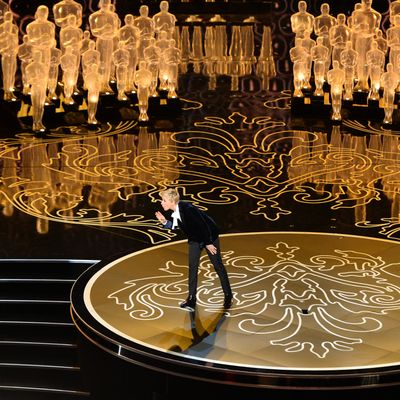
The Academy Awards telecast was too long. It didn’t spend its time wisely. The repartee was weak. There were too many montages and too many moments where the stars, the host included, seemed full of themselves. And it was still awesome. Why? Probably because the Oscars telecast is by its nature un-screw-upable. It’s a singular event: a three-plus hour live broadcast (six if you count the televised red carpet arrivals) that lets us watch impeccably dressed famous people go off-script, make mistakes (John Travolta’s mis-pronouncination of Idina Menzel’s name was the low point), struggle to balance personal pride with awareness of historical injustice (the awards for 12 Years a Slave and the AIDS-era drama Dallas Buyers’ Club sat rather uncomfortably amid the glamour and lightheartedness), and otherwise let what seem like authentic personalities shine through makeup-airbrushed facades.
Most of all, the broadcast is about loving movies and being fascinated by Hollywood glamour — two hours of red-carpet arrivals, people! — and wanting to be present when elder members of showbiz’s royal family are celebrated (see Jim Carrey’s unnerving impression of Best Actor nominee Bruce Dern) and new members inducted (somebody get Lupita Nyong’o an Audrey Hepburn part, preferably opposite Idris Elba in a tux).
And, more so now than probably ever, it’s about the dream that the entertainment machine will become more accessible to artists who aren’t white, and international in ways that aren’t just a matter of accents.
If both last night’s presentation and the awards it handed out are any indication, limited but visible progress has been made. Even when host Ellen DeGeneres, TV’s first out gay female star, was stretching out the show’s running time like a strand of pizza cheese, there was a refreshing big-tent sensibility. If the show was going to run long yet again, it was nice to see the likes of Lupita Nyong’o and her brother and seatmate Junior goofing around, taking part in a tweeted selfie and joining DeGeneres’s prolonged pizza-ordering gag (after being comically hassled for money, Nyong’o rooted around in her purse and handed Ellen a tube of lip gloss).
The broadcast featured more black presenters than any Oscar telecast, and made room for a 50th anniversary celebration of Sidney Poitier becoming the first black man to win a statuette as Best Actor (for 1963’s Lilies of the Field, honored during the 1964 telecast). Poitier co-presented the directing award to Gravity, which was directed by Alfonso Cuarón, the first Latino to take the prize in his category, and photographed by six-time nominee Emmanuel Lubezki, also Mexican-born. After enduring a near-shutout in major categories besides Supporting Actress, and being the target of a pretty sharp white liberal guilt barb by DeGeneres (who said at the top of the broadcast that there were two possible outcomes: Slave wins Best Picture or the Academy is racist), Steve McQueen’s historical drama slid in under the finish line to take the top prize. The statuette was presented by Will Smith, the top-grossing African-American film star in history, and capped by McQueen literally jumping for joy.
It seems fitting that the broadcast’s emotional peak was a celebration of the 75th anniversary of The Wizard of Oz, everybody’s favorite fable about a humble, anonymous traveler remaking herself in a land full of exotically dressed, magical creatures. The segment was introduced by Whoopi Goldberg, one of a handful of African-American performers to win an Oscar, and made Emma Watson, the English-born co-star of another great fantasy, the Harry Potter franchise, tear up at the film’s mere description. The film clips were so innately powerful that not even Pink’s of-the-moment vocal stylings while covering “Over the Rainbow” could break the spell.
It was, all things considered, an unusually emotional telecast, once you factored out the almost-four-hour length, the poorly articulated “Heroes” theme that ate up screen time with lumpy montages, and the crass ads for Samsung disguised as celebrations of the “Team Oscar” internship program.
The show was filled with authentic, sometimes authentically bizarre moments. Two involved Best Actor winner Matthew McConaughey: his presentation alongside Kim Novak (the award to animated film went to Frozen; the facial surgery jokes write themselves, unfortunately) and his three-minute, Elmer Gantry–like soliloquy at the end, in which he thanked God and his mother and informed us that since he was a boy, his hero has always been himself in ten years. (My hero is myself in 30 years. I am wearing a jet pack.) Blue Jasmine star Cate Blanchett teared up during her Oscar speech and somewhat pointedly thanked her writer and director Woody Allen, whose name is mud right now, and perhaps for all time. The image of Pharrell Williams, Best Song nominee for Despicable Me 2’s “Happy,” inspiring Meryl Streep and Amy Adams to dance was great, but it didn’t define the telecast like the sight of his first partner, Nyong’o, spontaneously getting all the way up out of her seat and shimmying in the aisle. It felt like she didn’t just belong there but had always been there somehow, for as many years as Streep, and had starred in just as many great movies. Here’s hoping. “No matter where you’re from,” the Kenyan Nyong’o said in her acceptance speech, “Your dreams are valid.”


